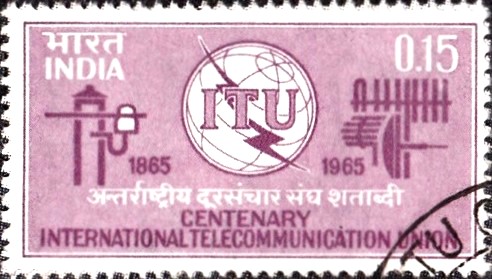
India on International Telecommunication Union
A commemorative postage stamp on the Centenary of International Telegraph Union (ITU), oldest specialized agency of United Nations, responsible for issues concerning information and communication technologies :
 Issued by India
Issued by India
Issued on May 17, 1965
Issued for : The Indian Posts & Telegraphs Department is happy to bring out a special stamp on May 17, 1965 to commemorate the centenary of the International Telecommunication Union.
Type : Stamp, Postal Used
Colour : Red Purple
Denomination : 0.15
Overall Size : 4.06 X 2.28 cms.
Printing Size : 3.7 X 2 cms.
Perforation : 13 x 13
Watermark : All over multiple ‘Lion Capital of Asoka’
Number Printed : 2 million
Set : 50 stamps per issue sheet
Printing Process : Photogravure
Designed and Printed at : India Security Press
About :
- The International Telecommunication Union celebrates its centenary on May 17, 1965. The oldest of international organisations, it is perhaps also the most successful. The founding of the International Telegraph Union in Paris a hundred years ago marked the beginning of a century of unbroken (except during the two world wars) and harmonious collaboration among the member countries for promoting the development, efficiency and utility of the Telecommunication services the world over.
- Briefly, the main objectives of the I.T.U. are to promote telecommunication development through international cooperation, ensure rational use of telecommunications, enlarge technical facilities, improve efficiency, formulate telegraph, telephone and radio regulations to ensure uniformity in procedure and tariff, disseminate information and to act as a body responsible for implementing the terms of the International Conventions.
- The organisation of the Union consists of the Plenipotentiary Conference which has the power to revise the International Telecommunication Convention; the Administrative Conferences which consider specific telecommunication matters; and the administrative Council with twenty five elected members of the Union which supervises the management and controls the budget of the ITU and provides the link with the United Nations Organisation and its allied agencies.
- The following are the permanent organs of the Union :
- (a) The General Secretariat of the Union with headquarters at Geneva. The Secretariat is the liaison between the telecommunication Administrations of the world, provides the administrative and financial services of the Union and publishes, among other valuable documents, the monthly, “Telecommunication Journal“.
- (b) The International Frequency Registration Board. This is an expert body of the elected members from different countries, giving help and advice in the assignment and utilisation of radio frequencies to ensure economic and coordinated use of the frequency spectrum by member Administrations.
- (c) The International Telegraph and Telephone Consultative Committee which is devoted to the study of technical, operation and tariff questions related to telegraphy and telephony and makes recommendations thereon.
- (d) The International Radio Consultative Committee which is a similar body investigating and advising on technical and operation matters connected with radio, including the new problems of space communication.
- The new and developing countries of Asia, Africa and Latin America look up to the ITU for many of their emergent needs like expert technical advice and assistance, grant of fellowships to telecommunication engineers, their training and execution of U.N. Special Fund Projects.
- A member of the Union ever since 1869, India has been actively associated with it over the last ninety six years. Particularly after Independence, she has made significant contribution as an elected member of the Administrative Council and as a nominee in a number of technical study groups. It is natural that India sets great store on the fascinating prospect of the countries of the world getting linked up in an international telecommunication network through a world wide communication system; in bringing this about, the role of the ITU, which has set a fine example of what international cooperation can achieve, cannot be over-emphasised. Having sponsored the observance of the International Cooperation Year, India considers it a fitting coincidence that the Year marks also the centenary of the I.T.U.


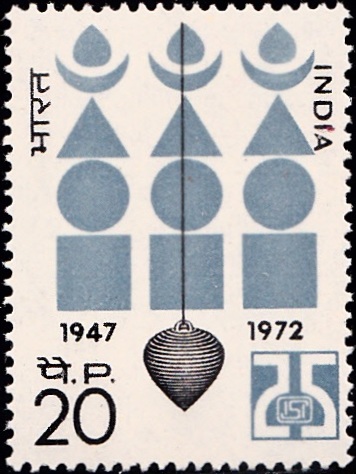
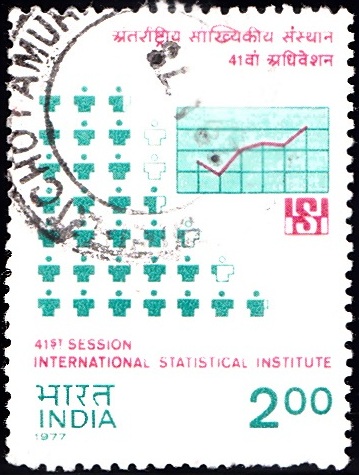
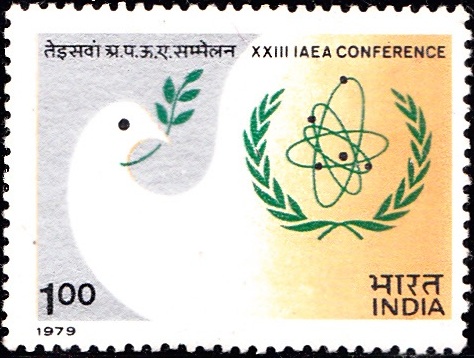
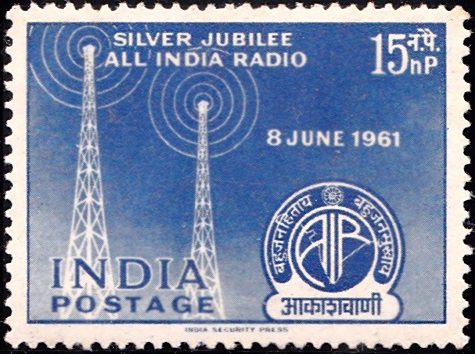
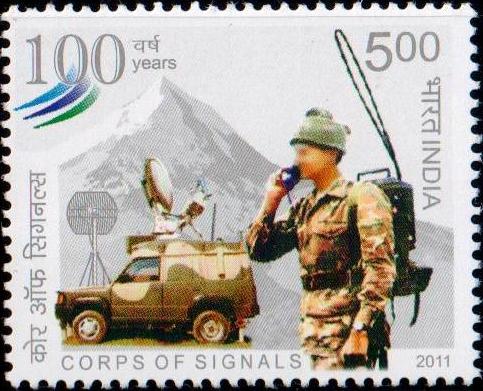
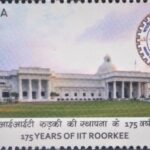
[…] : The International Telecommunication Union (ITU) has more than 150 member nations and is head-quartered in Geneva. As our nation in 1879, a […]
[…] Hume worked for the promotion of India‘s cause abroad. He conceived of the Indian Telegraph Union in order to finance the dissemination of the Indian viewpoint through press telegrams in British […]
[…] CCIR which was established in 1927 is one of the permanent organs of the International Telecommunication Union (ITU) which investigates and advises the ITU on technical and operation matters connected with […]
[…] step forward in the culmination of our ideal for one world. The Universal Postal Union and the International Telecommunications Union were the earliest International Organisations founded on this concept and were in this sense, the […]